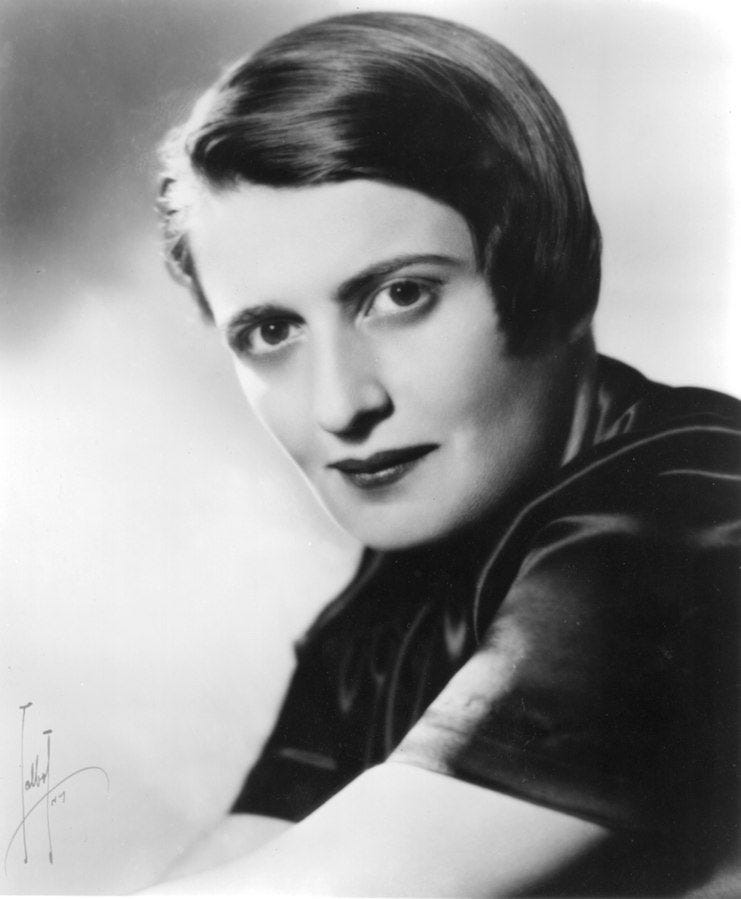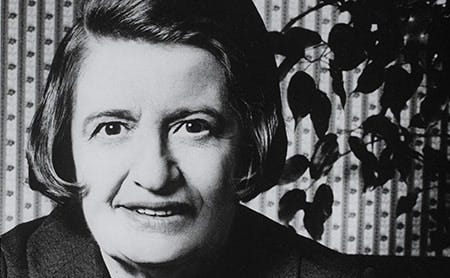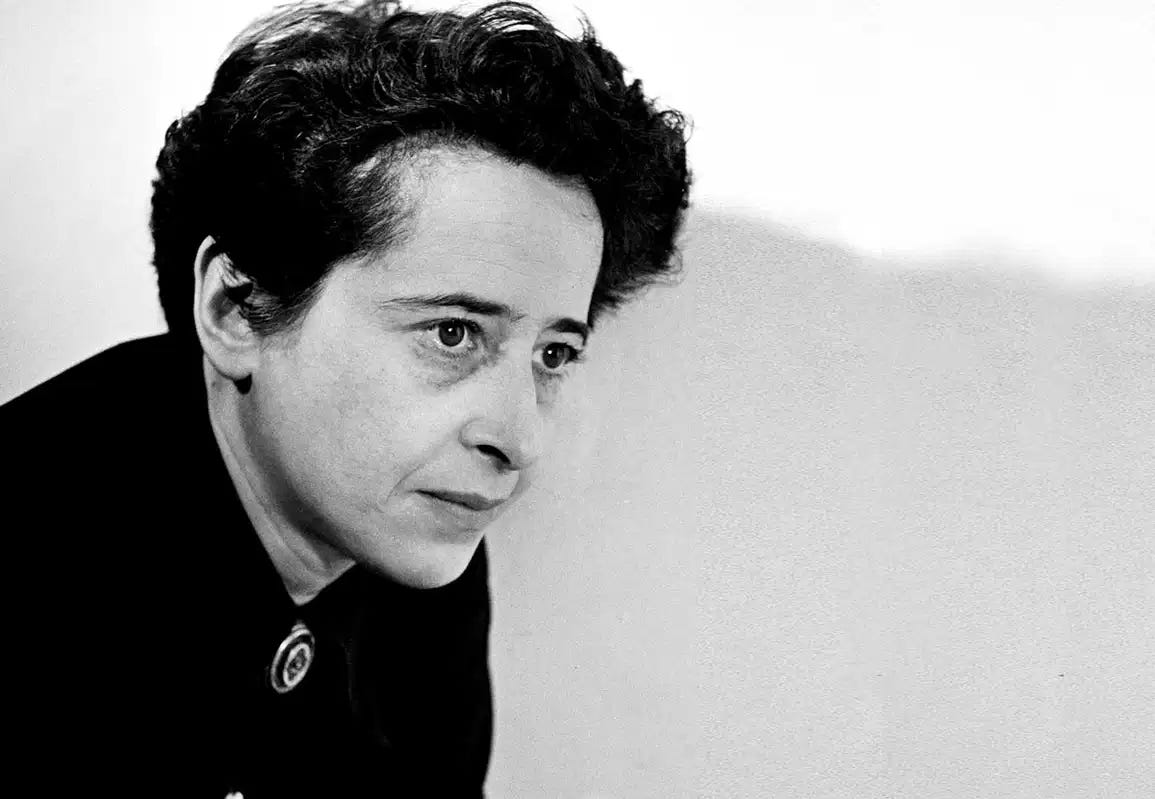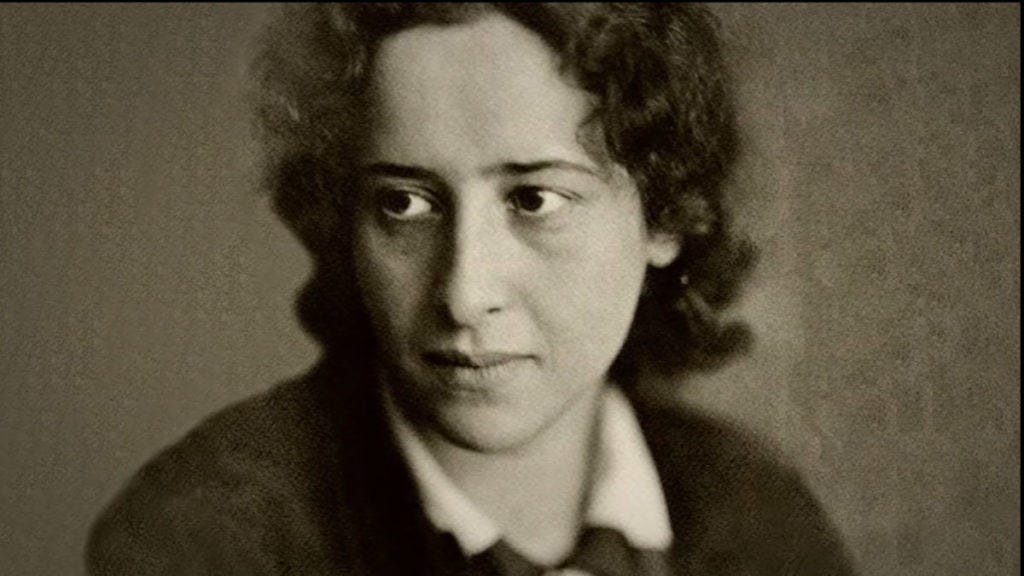Last week I told you of my plan to write about Ayn Rand, because Robert Reich quoted Elon Musk on July 1: “ ‘The fundamental weakness of Western civilization is empathy,’ Musk said, adding that liberals and progressives are ‘exploiting a bug in Western civilization, which is the empathy response.’ “ Musk’s statement reminded me of some Rand research I did twenty or so years ago. I remembered her stance on altruism (despicable in her eyes), which Musk seemed to mirror. I wanted to look deeper into her connection to the MAGA cult.
Then I watched a documentary on PBS: Hannah Arendt: Facing Tyranny. We learn about her life and the experiences that motivated her seminal book: The Origins of Totalitarianism. Again, the relevance to our current political situation is staggering, and I decided to explore both of these women – their lives, their work, their impact.
First of all, though, I should warn you: follow the link in the above quote at your own risk. It takes you to a YouTube interview of Elon Musk by Joe Rogan (from February, I believe). I watched some of it so you won’t have to; if you have any aesthetic sense, if you cherish beauty, if you think that a person's face reflects their values, please spare yourself the experience. Here are some other quotes to put the first one into context:
“...the government is a big pyramid scheme… Social Security is the biggest Ponzi scheme of all time… the future obligations of Social Security far exceeds the tax revenue [because] people are living way longer than expected and there are fewer babies being born [so] the financial situation [of] the federal government will be much worse in the future”
Nothing that higher taxes for billionaires couldn’t easily fix!
“...there was an interview with a whistleblower [who] was alleging that she was in charge of turning illegal immigrants into … Social Security recipients for Life, not just Social Security but disability [too] … Social Security, Disability, Medicaid for illegal aliens serves as a gigantic magnetic force to pull people in from all around the world and keep them here…”
“What's actually happened is they're [Democrats] buying voters. It's like a giant voter scam, they're importing voters… swing states will not be swing states in the future [but] a permanent one party State, a deep blue socialist State, that's what America will become …”
Hmmm. Projecting, much?
“...there's so much empathy that you actually suicide yourself…we've got civilizational suicidal empathy … I think you should care about other people but you need to have empathy for civilization as a whole [and] not let someone use your empathy against you so they can completely control your state… it's weaponized empathy”
Okay, enough of this. It makes your skin crawl. Back to Hannah Arendt and Ayn Rand.

Surprisingly, they have several things in common: both were born in Europe, little more than a year apart (Ayn Rand was born in 1905 in St. Petersburg, Russia, and Hannah Arendt was born in 1906 in Linden, now part of Hanover, Germany). Both were secular Jews. The political situation of their birthplace went through radical, violent transformations which caused both women to immigrate to the United States.
Ayn Rand witnessed the 1917 October Revolution which established Communism and the Soviet Union; her father’s pharmacy was collectivized and the family lived in poverty for several years. After studying history at Leningrad State University, Ayn Rand was granted a visa to visit relatives in Chicago in 1925; she arrived in New York City early in 1926 and moved to Hollywood/CA a few months later. One can imagine that her childhood experiences were the cause for her lifelong anti-communist sentiments.
When Hannah Arendt was born and grew up, Germany was still an Empire! (Emperor Wilhelm II abdicated a few days before the end of World War I.) They lived in Berlin, and her parents were social democrats whose friends included intellectuals, writers, and artists. Hannah was a gifted child who had learned classical Greek and read Kant by the time she was 14. After finishing high school she was accepted at Marburg University where she studied philosophy, German literature, and classical languages. One of her professors was Martin Heidegger, one of the most important and influential philosophers of the 20th century. They entered a long, for the first four years intimate, friendship which was interrupted when Heidegger joined the Nazi Party in 1933.
Short interlude: This is something I only learned fairly recently. I was a student at the Ludwig Maximilian University in Munich in the late 1960s, majoring in philosophy. The most prestigious professor at the time, Max Müller, whose Heidegger lectures I attended, also was a Nazi. But we students had no idea, both his and Heidegger’s Nazi affiliation was kept secret. The German government at the time was conservative and right-leaning, there were rumors of former Nazis being part of it, but my professor? Heidegger? I bet his auditorium would have been quite empty, had we known.
Because she was Jewish, Hannah Arendt’s academic career as well as her private life were violently disrupted after Hitler became chancellor in 1933, civil liberties were suspended, and antisemitism became ubiquitous. Both Hannah and her mother were arrested by the Gestapo; they lived in Berlin and were active anti-Nazis. They were released a few days later by sheer luck, but the experience was enough for them to grasp that they had to escape. They eventually made it to Paris where Hannah was reunited with her husband Günther Stern (they had gotten married in 1929, but he had fled Berlin earlier in 1933 because of his association with communism).

In Paris, Hannah worked for an organization that helped children and youth to escape from the Nazis and resettled them in Mandatory Palestine. Shortly before the German invasion of France (1940) she was forced into an internment camp as an “enemy alien”. The camp was in France’s southern half which became Vichy France, collaborators with Nazi Germany. Within a few weeks Hannah Arendt managed to obtain the papers that made it possible to leave the camp, then find her way to Marseille to get a passport and a visa for the United States, travel to Lisbon/Portugal, and secure passage on a ship to New York in May 1941.
Both women produced the major part of their literary work while living in the United States. Ayn Rand started as a screenwriter in Hollywood but had the biggest success with her novels The Fountainhead (1943) and Atlas Shrugged (1957). Both advocate her philosophy of rational self-interest, the virtue of selfishness, and the evil of altruism.
Hannah Arendt worked as the editor for a book publisher, Schocken Books. Her first major work, The Origins of Totalitarianism, came out in 1951. After The Human Condition (1958) and On Revolution (1963), her most influential and controversial book became Eichmann in Jerusalem: A Report on the Banality of Evil (1964), based on her reports about the trial which she wrote for The New Yorker. She travelled to Jerusalem and attended six weeks of the five-months long trial.
I will examine and compare the political theories and philosophical viewpoints of both women in Part II.







I also think Musk is a sociopath, along with most of the current administration.
Very interesting. Would really like to see your side-by-side comparison of Musk’s perception of altruism versus Rand’s